Opinion
Kenny Schachter Found the Future at a Shanghai Art Fair (Even If His Kids Got Censored)
Doing the city's Art021 expo last week was an eye-opening family affair.
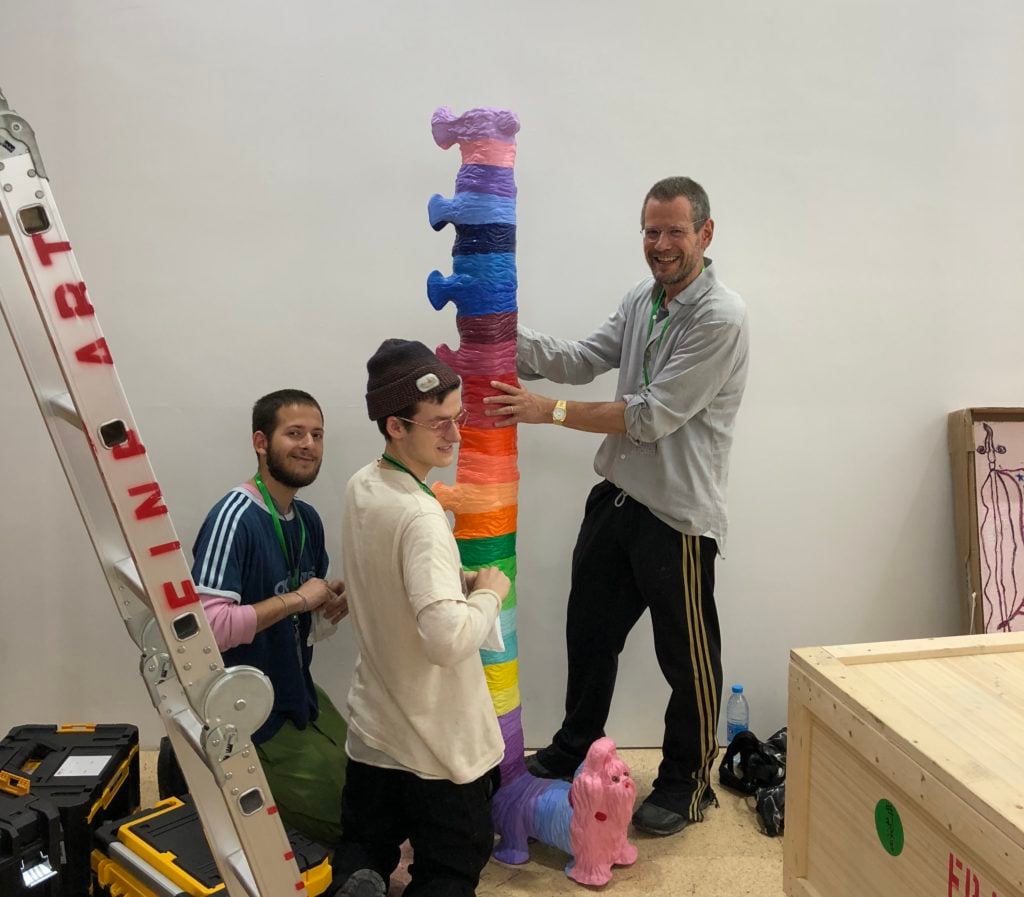
Doing the city's Art021 expo last week was an eye-opening family affair.

Kenny Schachter

Last week there were two simultaneous international art fairs in Shanghai, one being Art021 Shanghai Contemporary Art Fair—the five-year-old event launched by (very) young public-relations entrepreneurs Kelly Ying and Bao Yifeng and the transportation executive David Chau—and Westbund Art & Design, a government-led initiative directed by the artist Zhou Tiehai. Art021 is the larger, more sprawling affair with just over a hundred galleries, while Westbund weighs in with 70 participants; about 20 galleries overlap, choosing to do both.
Rampant comparisons (and sniping) between the two enterprises is incessant: Art021 skews younger, attracting a celeb/media contingent due to the PR penchants of its founders, while Westbund reflects a more traditional (as far as fairs go) layout and clientele. I had the notion to participate in a Chinese fair to get a tangible sense of the nascent market—and a possible foothold in it while I was at it. Though I’ve never operated a professionally run gallery in the conventional sense, and with my youth far behind me, I pitched Art021 on the concept of staging a new version of the “Nuclear Family” exhibition I curated at Ibid Gallery in Los Angeles over the summer. They graciously assented and offered to sponsor the project. I’d hung a shingle in Shanghai.
Sitting a fair is an altogether different mindset I (purposefully?) forgot since quitting gallerydom 10 years ago in favor of striding the aisles as a private practitioner. Truth be told, I had received help in opting for early retirement, having been thrown out of the Armory Show for exhibiting secondary-market artworks before they sanctioned such material, and booted from Art Basel twice—once for an over-encroaching Vito Acconci architectural intervention and the other time for displaying 25 historical and contemporary artists in the Nova section, meant to showcase the recent output of up to three artists. (Perusing the small print is not my strong point.) I was told in advance never to bother applying to Frieze.
I wasn’t sure what to expect this time around, nor how long I could manage to hold the fort with the sole assistant the fair had sourced for me. I ended up minding the booth for nearly the entire duration and actually had a ball—I didn’t want to leave. I’m not the most patient person and rarely interface with the retail side of the art trade, preferring dealer-to-dealer dealing, but here you are about to get a firsthand account of life in the trenches, an undertaking quite unlike anything you can fathom.
I could talk to art dealers all day long, it’s true. I love them because they unequivocally support—and buy—art with an all-encompassing passion and fervor. And it’s a good thing because for the week we lived under shared roofs, drank and ate our meals together, and didn’t communicate with many outside the ranks. I could chase Thaddaeus Ropac around the lobby of my hotel with abandon before getting barraged myself with Tala Madani JPEGs from Pilar Corrias while waiting for a taxi out front. (They never take you exactly where you want to go in Shanghai, for some reason.)
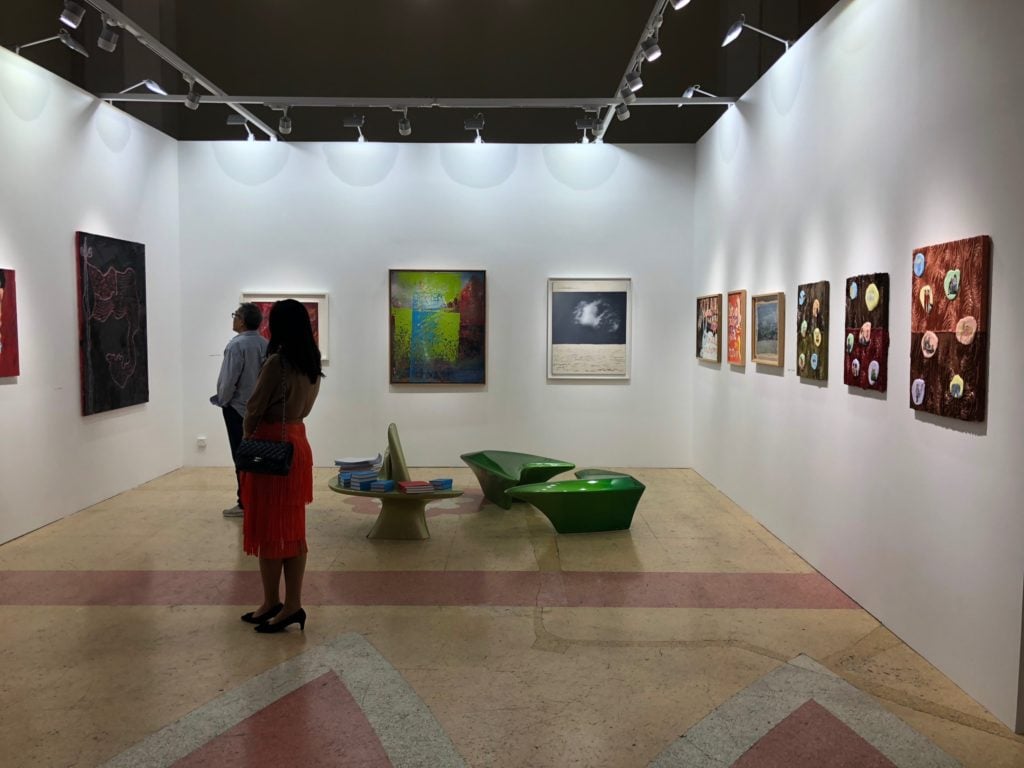
Kenny’s Art021 booth.
On a more practical note, I didn’t have the opportunity to pee or eat much over the course of the fair, subsisting on diet of anxiety by day and Chinese food and red wine at night, with nothing in between. The hours are long, stressful, and grueling, but what choice have I (or anyone else)? The future is now and it’s likely to be centered in Asia. Selling art is hard fucking work, not least of all due to fairgoers’ propensity to seek unheard-of discounts and then, should you relent, asking for more! I should follow suit. Funny how jaded Western collectors are generally too timid and intimidated to do the same—though I do know a few who have little compunction about trying.
What makes participating in a Shanghai fair different from an Art Basel fill-in-the-blanks is the largely local character of the audience—at least 90 percent Asian—and the more diverse cultural mix of what’s on offer. Also, getting an outlet and grid of lights installed is quicker and easier than spelling the word U-N-I-O-N. The habit of putting things on hold at a fair has a whole other meaning in China, to the extent that when I asked a gallerist how her day was, she responded: “I got some new reserves.” Fair management worldwide might consider a moratorium on holds: just say no. The result is a sea of unsellable art as it lingers in an eternal state of suspension. Also, to move the foot traffic along, a dedicated phone-user lane might be an additional area for exploration.
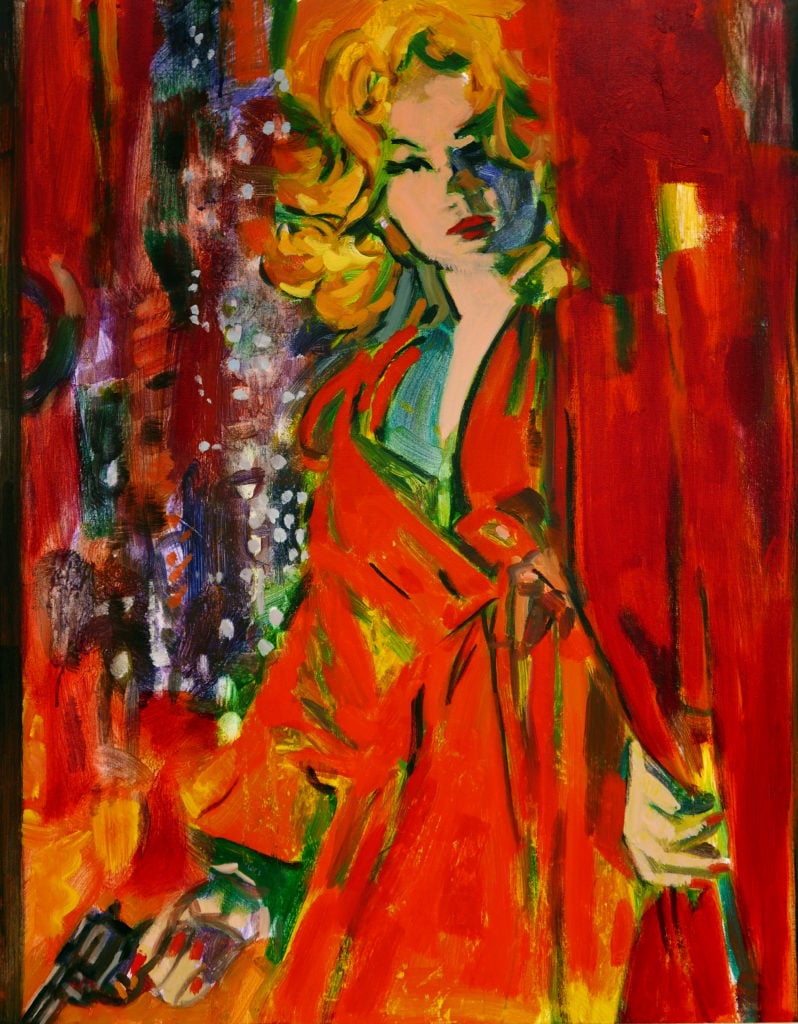
Walter Robinson’s Below Suspicion (2017) was in the booth.
The predominance of social-media platforms and their deep impact on the nature of the experience and consumption of art is beyond anything I’ve ever seen. Factoring in Weibo and WeChat, you have a whole new level of social mania gone amok. At my age, to have to tackle yet another format—and the concomitant time and effort required to do so—is offputting to say the least. But the moment I figured out how to work my gizmo, my WeChat post of a painting attracted interest in seconds. One women inadvertently missed my booth (not uncommon, read on) but her husband found Walter Robinson’s paintings on Weibo and she returned and… put them on hold. By the way, there was a standalone “Poison Pen” page—that’s the moniker the many fans (and more detractors) of my column have given me in China—posted anonymously on WeChat.
At Art021 I noticed more than a handful of media types swan in with a phalanx of photographers and videographers in tow—BYOP (Bring Your Own Paparazzi). Men and woman in dark sunglasses with readymade entourages, they strutted the aisles like a fashion runway, looking at little else but the cameras in front of them. Apparently, art as an outpost of celebratism, and the glamorization of the art-world lifestyle, is no longer just an Art Basel Miami thing.
In my decade-long sabbatical as an art-fair exhibitor, it had escaped me how, in the throes of defending your booth (it’s no less than a territorial struggle), you literally can’t see two feet in front of your nose. Especially when your neighbor is a Hublot stand (the Swiss watchmaker) with blaring classical music and art by Romero Britto, none of which I was able to clock until days into the proceedings. My booth was located between the entrance and the gallery section, a kind of inside/outside position sandwiched betwixt the street and mainstream, not unlike my art-world status.
In this prime (they told me) position, I was faced with the tall order of replacing Adrian Brody’s booth from the previous edition featuring his own paintings of fish, fittingly titled “Hooked,” and photographs by his mother. Like the art located on the outside walls of a booth, if you’re not situated in thick of things you can easily be overlooked by a chunk of the audience, which I was. Nevertheless, Art021 was brave and generous for hosting me, and I’m appreciative for their hospitality. I already want more.
I had a worrying call just prior to the opening from Art021 that censors had conducted a vetting of the fair and threatened to shut down the entire event down if four of my son Kai’s paintings depicting distorted American flags were not immediately withdrawn. We initially had to submit materials for review in August to pass governmental muster, but these works were hand-carried in at the last moment. While Trump was on his state visit to Beijing, the censors argued over the number of Kai’s stars and stripes—namely that there weren’t enough stars, and that such an omission could be considered a provocation to the US president. To be honest, I’m not quite sure there was a reason for the miscount one way or the other.
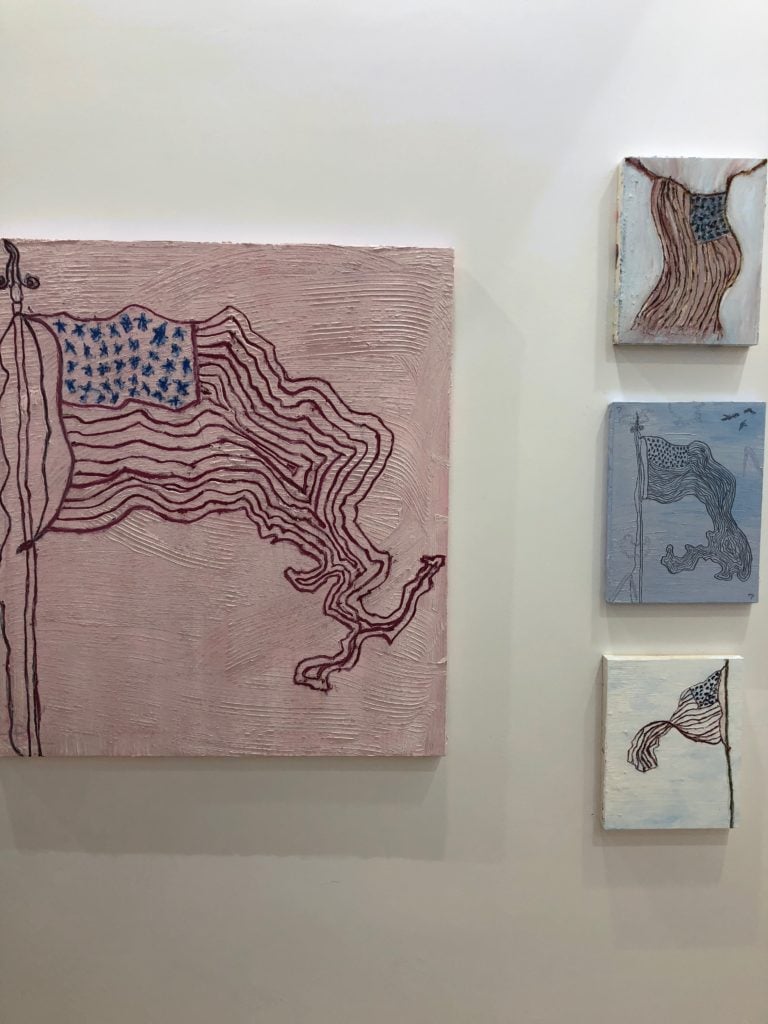
Works censored (and sold) by Kai Schachter.
After we begrudgingly removed the works (which were exceptional, I’d be remiss not to mention), we received a call from management that all four had sold to a relation of the fair after being seen on the internet. Before Shanghai, I had no Chinese clients and auctioned a single work at Sotheby’s Hong Kong last year. Now, I have a bona fide collector, though one I’ve never met and don’t know. When I sold works by Adrian (my 21-year-old) to a British friend, I thought of raising his prices, to which my son replied: “Don’t Zombie Formalize me” (Adrian actually named one of those poor bastards as an admonition, but made me swear not to mention him). Whoa, he’s got a point. Also, Walter’s presence in the booth was evidently having an impact.
Oftentimes, Chinese people who work in the West give themselves random English names to make things easier for us to say and remember; I wish I could do the same, but I’m language illiterate. Fortunately, I had help easing the way in the form of my super-efficient assistant, who also ran a blog called Picasso and the Single Girl, and whose extremes of self-promotion outshone mine. She rocked up at the opening with a sparkly red question mark bobbing from the middle of her head, promoting another project. I practically had a conniption. At the same time, the press and audience response to the booth was nuts—they were terrifically receptive. Besides the works themselves, I was photographed more than at my wedding and bar mitzvah combined.
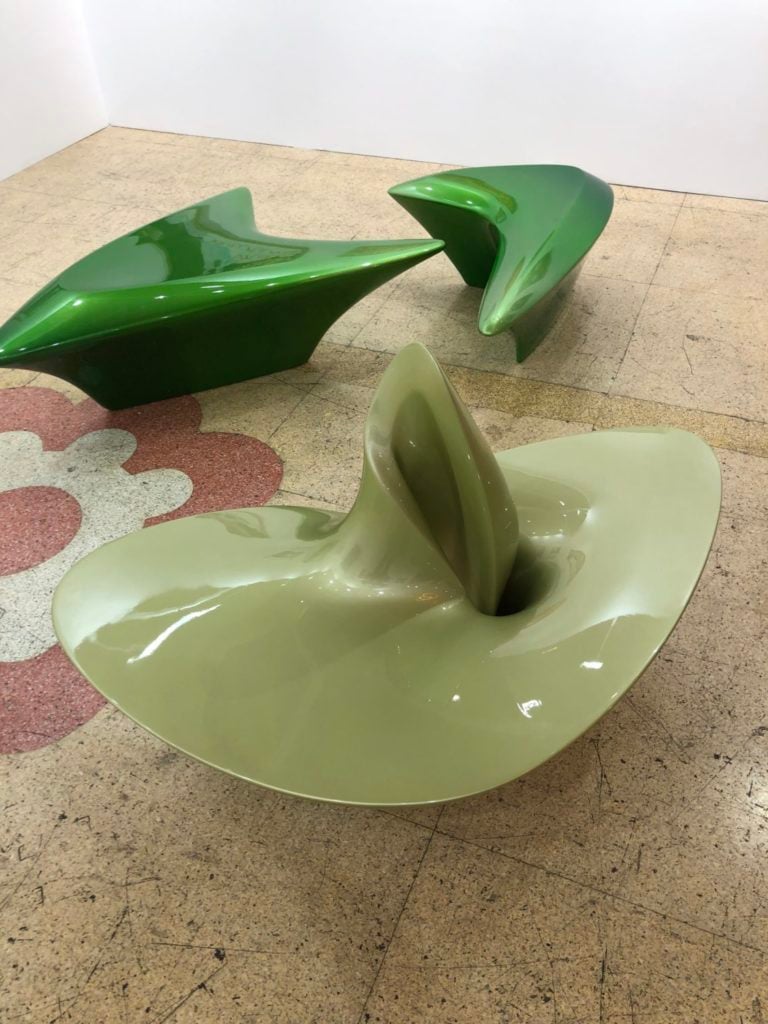
Chairs by Zaha Hadid.
Meanwhile, buzzing through the 021 fair like a current of electricity was the news that Marlborough’s Francis Bacon painting of John Edwards, with an asking price of $25 million, had sold. To a Chinese collector, I was subsequently alerted. It was like infectious gossip in a schoolyard—except I was informed by the gallery that it wasn’t so. Fake news. Other forms of misinformation were rife as well, as when a visitor to my booth questioned the authenticity of the Gerhard Richters on view, as if they were bootlegs. Another fairgoer then plopped down on my Zaha Hadid stool and stated: “I don’t know how to evaluate art so go ahead and start teaching me.” As Ivan Wirth once said to me, this is a “relations-management” business, and an incremental, slow-burning process at that. Sales were plentiful for some, as usual, at both venues, including Zwirner and Blain Southern.
You forge awfully close relations with your peers, slammed into the same hotel lobby night after night. It can become a tad incestuous—akin to dorm decorum, and equally entertaining. Drama abounds, like when a famous young artist had it out with a collector/advisor because of her subterfuge in buying a work jointly with another collector/advisor. I lost count of the times they made up then spiraled back into mutual animus, but it concluded with the declaration that the collector was lucky to own a piece of art history. Hey, you don’t get far without a healthy measure of self-belief, and here it was in spades. I felt like a professional athlete returning to sports after a long hiatus, relishing the camaraderie, community, fun, and frolic. And the fighting.
I became Kenny + four, dragging my (artist) kids to dinners—I was alone with the lot as my wife Ilona stayed behind to work—and at one I sat next to a Korean dealer who previously owned a Richter in my booth. As Rosemary Trockel said to me decades ago, the world is small and the art world is miniscule. That was in 1990 and it still holds true, despite rampant global art-world domination. The following day, I met another Korean collector of the very same Richter. Enough.
When I was finally able to steal a rest, I sent the kids to a Zwirner after-party (they were invited) and a local dealer nicknamed Sage, my 15-year-old who famously set my house on fire, “Fireboy.” The four of them ended up at the notorious karaoke club Shanghai Nights, running from one private room to the next to evade a pack of security guards like an episode of “Scooby Doo.” Returning to the hotel late into the night, they were fitting right in—too well.
I guess I’m a little rusty at this frontline work—when all was said and done, I sold a fistful of the kids’ art but nothing further, although a few deals are pending with other dealers (status quo). But we had the best time ever, the only downside being the slowness of the plane trips, but even 14 hours onboard didn’t put me off a hunger for more. With extreme time differences and violent jet lag you miss people going and coming, instead of vice versa. A Los Angeles advisor said he did Shanghai instead of Miami Basel, which makes perfect sense to me—this was an adventure well worth repeating. There’ll be plenty of chances for a return visit, as Art021 is opening in Beijing in May.
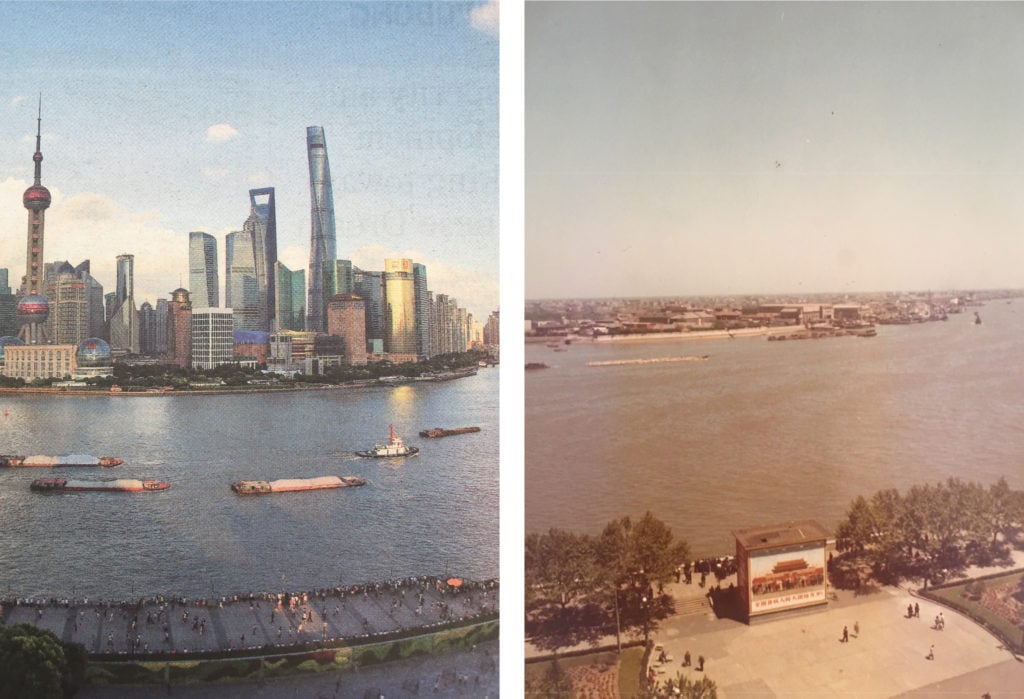
The view from Shanghai across the river to Pudong in 1976 (at right) and 2017 (at left). Image courtesy of Dieter von Graffenried.
I hate to generalize, but the rigor and voracious approach to art I witnessed in China was astounding and far-reaching. It was eye-opening and infectious when I was there—only to land in New York afterwards to cover (and participate in) the auctions, flicking on Fox News to hear that China is the enemy amid a call to completely end trade. In Shanghai, I had bumped into Dieter von Graffenried (who founded Parkett magazine in 1984 in Zurich), who has long been involved in the region. He relayed the unquenchable curiosity of the population and said: “They want to know about us more than we want to know about them.” He showed me a photo he took in the 1970s of the city’s then-barren Pudong district in relation to the bustling metropolis it is now. Like Dieter, I’m hooked.